Dynamic Business Environment (5T4Z0001): ZARA's Social Impact
VerifiedAdded on 2022/08/25
|11
|2983
|17
Essay
AI Summary
This essay delves into the dynamic business environment, focusing on the fast-fashion brand ZARA and the significant influence of societal factors on its global operations. It explores how globalization has shaped ZARA's business model, particularly concerning production, marketing, and distribution across diverse cultures. The essay examines specific social implications, including lifestyle, buying behavior, cultural norms, and ethical considerations such as sustainability and corporate social responsibility. It also discusses how ZARA adapts to varied consumer preferences, religious beliefs, and educational levels in different markets. The analysis highlights the impact of these factors on ZARA's brand image, marketing strategies, and overall success, providing insights into how the company navigates the complexities of a globalized world, including the need for ethical labor practices, sustainable sourcing, and inclusive initiatives to meet evolving consumer expectations and maintain a positive brand reputation. The essay also touches upon the importance of understanding cultural differences in countries where the brand operates and adapting to local norms and expectations.
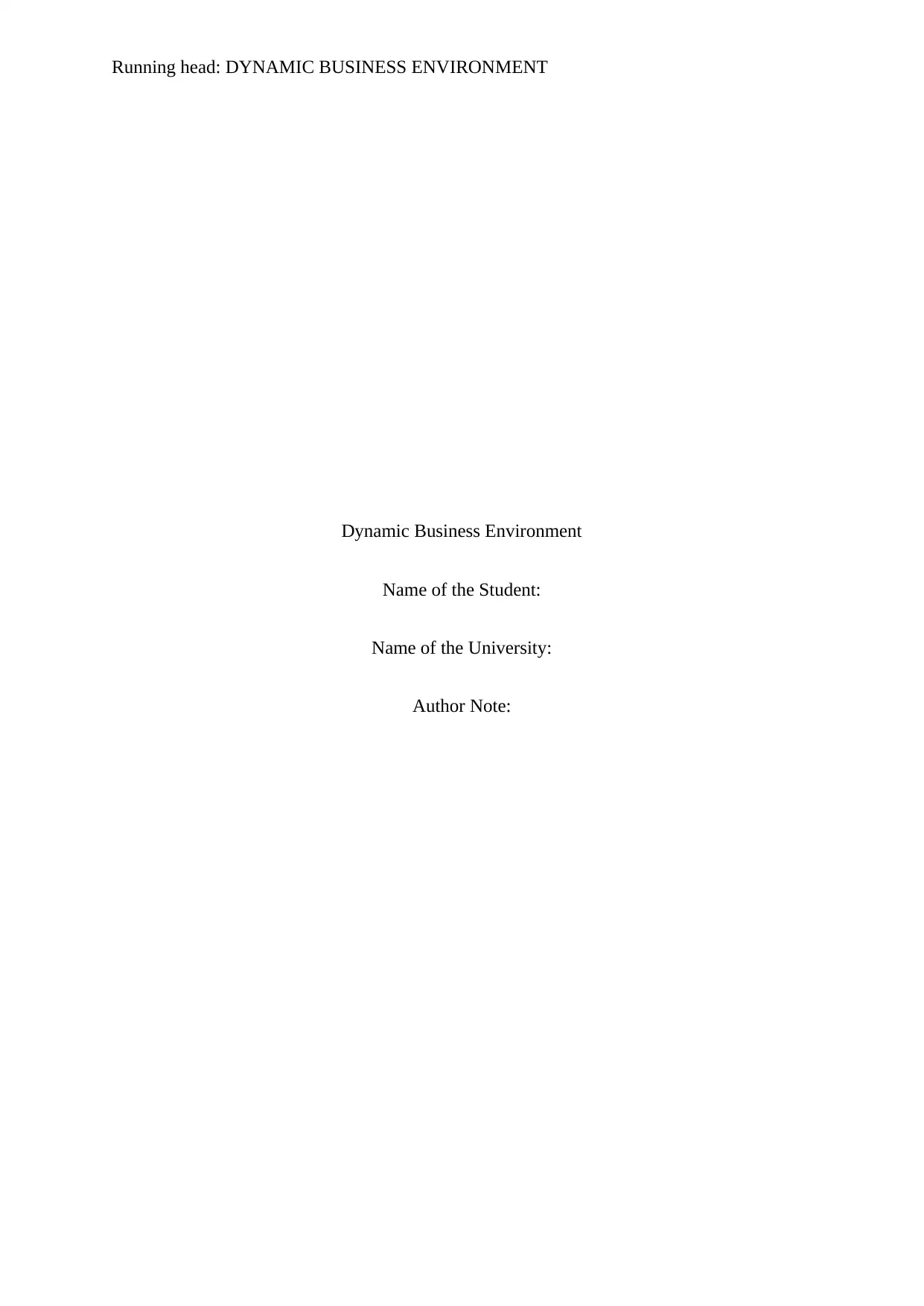
Running head: DYNAMIC BUSINESS ENVIRONMENT
Dynamic Business Environment
Name of the Student:
Name of the University:
Author Note:
Dynamic Business Environment
Name of the Student:
Name of the University:
Author Note:
Paraphrase This Document
Need a fresh take? Get an instant paraphrase of this document with our AI Paraphraser
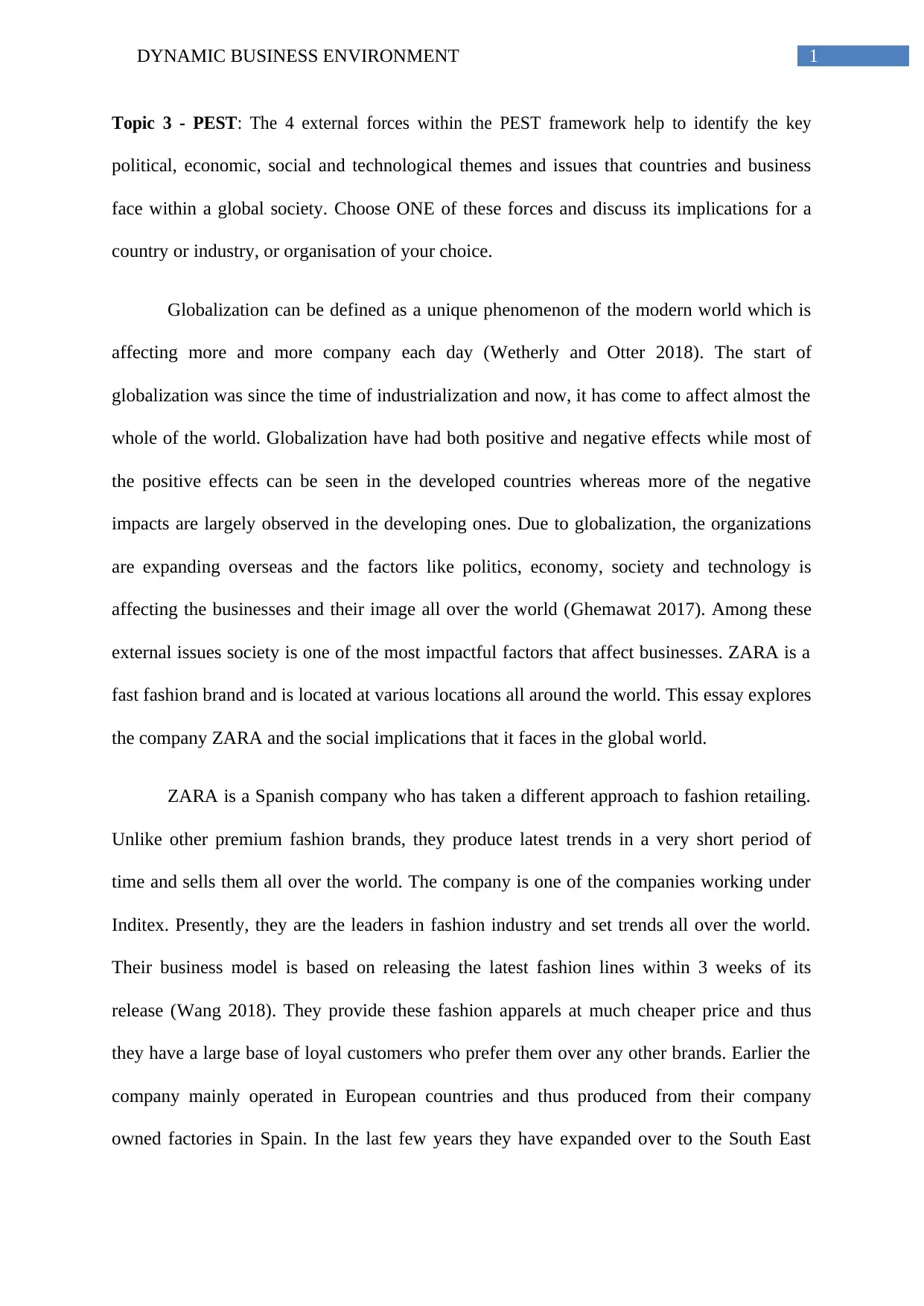
1DYNAMIC BUSINESS ENVIRONMENT
Topic 3 - PEST: The 4 external forces within the PEST framework help to identify the key
political, economic, social and technological themes and issues that countries and business
face within a global society. Choose ONE of these forces and discuss its implications for a
country or industry, or organisation of your choice.
Globalization can be defined as a unique phenomenon of the modern world which is
affecting more and more company each day (Wetherly and Otter 2018). The start of
globalization was since the time of industrialization and now, it has come to affect almost the
whole of the world. Globalization have had both positive and negative effects while most of
the positive effects can be seen in the developed countries whereas more of the negative
impacts are largely observed in the developing ones. Due to globalization, the organizations
are expanding overseas and the factors like politics, economy, society and technology is
affecting the businesses and their image all over the world (Ghemawat 2017). Among these
external issues society is one of the most impactful factors that affect businesses. ZARA is a
fast fashion brand and is located at various locations all around the world. This essay explores
the company ZARA and the social implications that it faces in the global world.
ZARA is a Spanish company who has taken a different approach to fashion retailing.
Unlike other premium fashion brands, they produce latest trends in a very short period of
time and sells them all over the world. The company is one of the companies working under
Inditex. Presently, they are the leaders in fashion industry and set trends all over the world.
Their business model is based on releasing the latest fashion lines within 3 weeks of its
release (Wang 2018). They provide these fashion apparels at much cheaper price and thus
they have a large base of loyal customers who prefer them over any other brands. Earlier the
company mainly operated in European countries and thus produced from their company
owned factories in Spain. In the last few years they have expanded over to the South East
Topic 3 - PEST: The 4 external forces within the PEST framework help to identify the key
political, economic, social and technological themes and issues that countries and business
face within a global society. Choose ONE of these forces and discuss its implications for a
country or industry, or organisation of your choice.
Globalization can be defined as a unique phenomenon of the modern world which is
affecting more and more company each day (Wetherly and Otter 2018). The start of
globalization was since the time of industrialization and now, it has come to affect almost the
whole of the world. Globalization have had both positive and negative effects while most of
the positive effects can be seen in the developed countries whereas more of the negative
impacts are largely observed in the developing ones. Due to globalization, the organizations
are expanding overseas and the factors like politics, economy, society and technology is
affecting the businesses and their image all over the world (Ghemawat 2017). Among these
external issues society is one of the most impactful factors that affect businesses. ZARA is a
fast fashion brand and is located at various locations all around the world. This essay explores
the company ZARA and the social implications that it faces in the global world.
ZARA is a Spanish company who has taken a different approach to fashion retailing.
Unlike other premium fashion brands, they produce latest trends in a very short period of
time and sells them all over the world. The company is one of the companies working under
Inditex. Presently, they are the leaders in fashion industry and set trends all over the world.
Their business model is based on releasing the latest fashion lines within 3 weeks of its
release (Wang 2018). They provide these fashion apparels at much cheaper price and thus
they have a large base of loyal customers who prefer them over any other brands. Earlier the
company mainly operated in European countries and thus produced from their company
owned factories in Spain. In the last few years they have expanded over to the South East
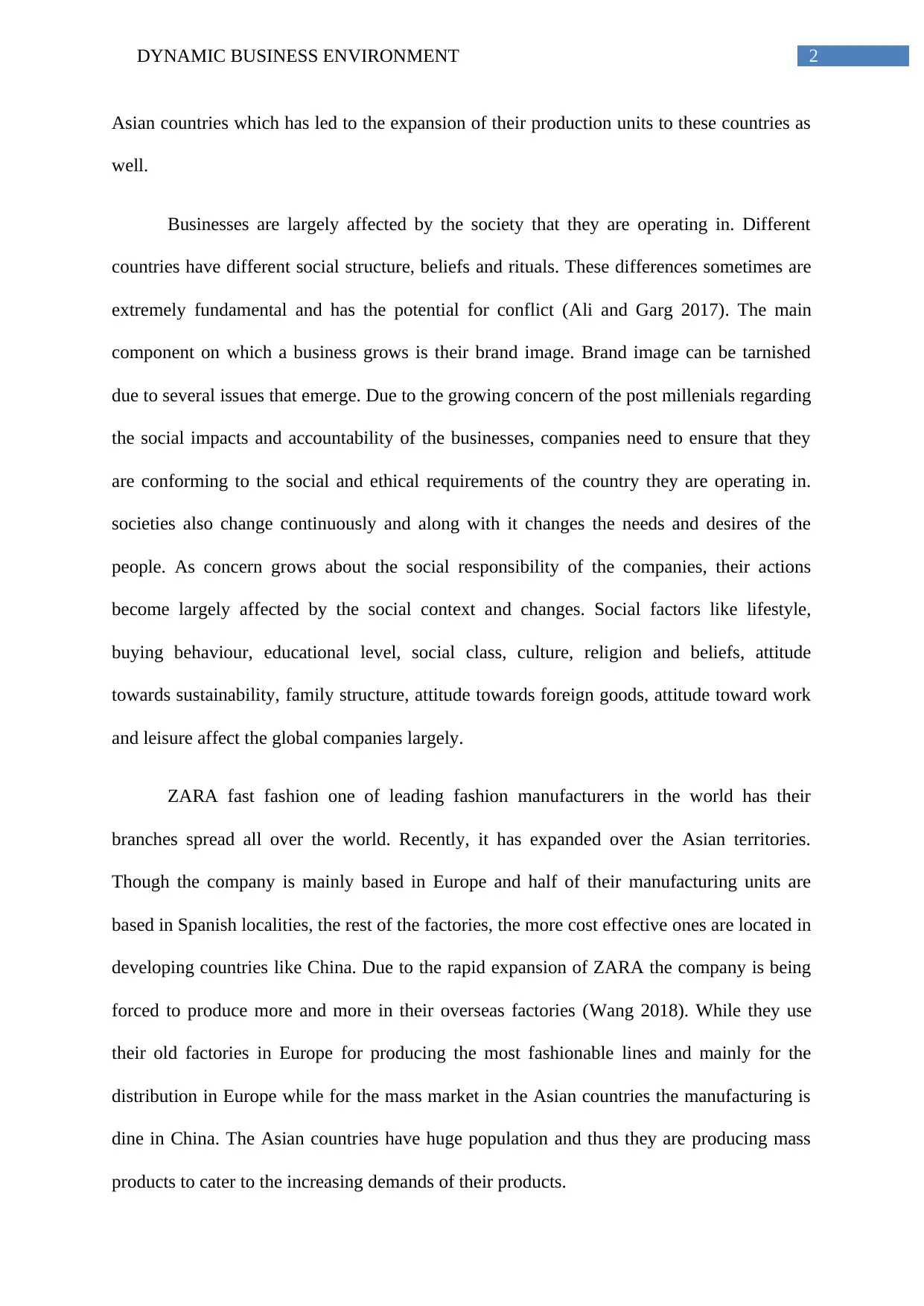
2DYNAMIC BUSINESS ENVIRONMENT
Asian countries which has led to the expansion of their production units to these countries as
well.
Businesses are largely affected by the society that they are operating in. Different
countries have different social structure, beliefs and rituals. These differences sometimes are
extremely fundamental and has the potential for conflict (Ali and Garg 2017). The main
component on which a business grows is their brand image. Brand image can be tarnished
due to several issues that emerge. Due to the growing concern of the post millenials regarding
the social impacts and accountability of the businesses, companies need to ensure that they
are conforming to the social and ethical requirements of the country they are operating in.
societies also change continuously and along with it changes the needs and desires of the
people. As concern grows about the social responsibility of the companies, their actions
become largely affected by the social context and changes. Social factors like lifestyle,
buying behaviour, educational level, social class, culture, religion and beliefs, attitude
towards sustainability, family structure, attitude towards foreign goods, attitude toward work
and leisure affect the global companies largely.
ZARA fast fashion one of leading fashion manufacturers in the world has their
branches spread all over the world. Recently, it has expanded over the Asian territories.
Though the company is mainly based in Europe and half of their manufacturing units are
based in Spanish localities, the rest of the factories, the more cost effective ones are located in
developing countries like China. Due to the rapid expansion of ZARA the company is being
forced to produce more and more in their overseas factories (Wang 2018). While they use
their old factories in Europe for producing the most fashionable lines and mainly for the
distribution in Europe while for the mass market in the Asian countries the manufacturing is
dine in China. The Asian countries have huge population and thus they are producing mass
products to cater to the increasing demands of their products.
Asian countries which has led to the expansion of their production units to these countries as
well.
Businesses are largely affected by the society that they are operating in. Different
countries have different social structure, beliefs and rituals. These differences sometimes are
extremely fundamental and has the potential for conflict (Ali and Garg 2017). The main
component on which a business grows is their brand image. Brand image can be tarnished
due to several issues that emerge. Due to the growing concern of the post millenials regarding
the social impacts and accountability of the businesses, companies need to ensure that they
are conforming to the social and ethical requirements of the country they are operating in.
societies also change continuously and along with it changes the needs and desires of the
people. As concern grows about the social responsibility of the companies, their actions
become largely affected by the social context and changes. Social factors like lifestyle,
buying behaviour, educational level, social class, culture, religion and beliefs, attitude
towards sustainability, family structure, attitude towards foreign goods, attitude toward work
and leisure affect the global companies largely.
ZARA fast fashion one of leading fashion manufacturers in the world has their
branches spread all over the world. Recently, it has expanded over the Asian territories.
Though the company is mainly based in Europe and half of their manufacturing units are
based in Spanish localities, the rest of the factories, the more cost effective ones are located in
developing countries like China. Due to the rapid expansion of ZARA the company is being
forced to produce more and more in their overseas factories (Wang 2018). While they use
their old factories in Europe for producing the most fashionable lines and mainly for the
distribution in Europe while for the mass market in the Asian countries the manufacturing is
dine in China. The Asian countries have huge population and thus they are producing mass
products to cater to the increasing demands of their products.
⊘ This is a preview!⊘
Do you want full access?
Subscribe today to unlock all pages.

Trusted by 1+ million students worldwide
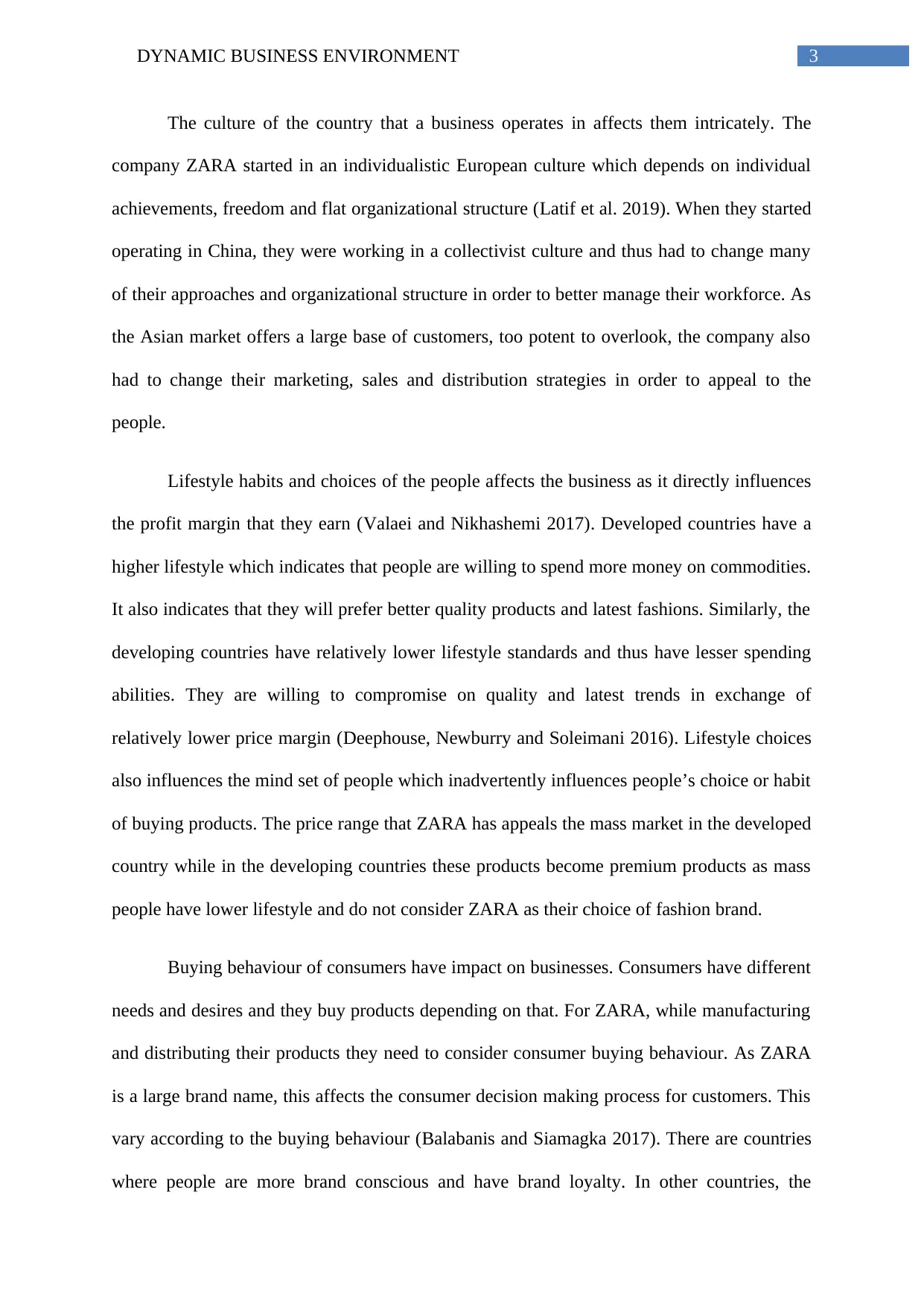
3DYNAMIC BUSINESS ENVIRONMENT
The culture of the country that a business operates in affects them intricately. The
company ZARA started in an individualistic European culture which depends on individual
achievements, freedom and flat organizational structure (Latif et al. 2019). When they started
operating in China, they were working in a collectivist culture and thus had to change many
of their approaches and organizational structure in order to better manage their workforce. As
the Asian market offers a large base of customers, too potent to overlook, the company also
had to change their marketing, sales and distribution strategies in order to appeal to the
people.
Lifestyle habits and choices of the people affects the business as it directly influences
the profit margin that they earn (Valaei and Nikhashemi 2017). Developed countries have a
higher lifestyle which indicates that people are willing to spend more money on commodities.
It also indicates that they will prefer better quality products and latest fashions. Similarly, the
developing countries have relatively lower lifestyle standards and thus have lesser spending
abilities. They are willing to compromise on quality and latest trends in exchange of
relatively lower price margin (Deephouse, Newburry and Soleimani 2016). Lifestyle choices
also influences the mind set of people which inadvertently influences people’s choice or habit
of buying products. The price range that ZARA has appeals the mass market in the developed
country while in the developing countries these products become premium products as mass
people have lower lifestyle and do not consider ZARA as their choice of fashion brand.
Buying behaviour of consumers have impact on businesses. Consumers have different
needs and desires and they buy products depending on that. For ZARA, while manufacturing
and distributing their products they need to consider consumer buying behaviour. As ZARA
is a large brand name, this affects the consumer decision making process for customers. This
vary according to the buying behaviour (Balabanis and Siamagka 2017). There are countries
where people are more brand conscious and have brand loyalty. In other countries, the
The culture of the country that a business operates in affects them intricately. The
company ZARA started in an individualistic European culture which depends on individual
achievements, freedom and flat organizational structure (Latif et al. 2019). When they started
operating in China, they were working in a collectivist culture and thus had to change many
of their approaches and organizational structure in order to better manage their workforce. As
the Asian market offers a large base of customers, too potent to overlook, the company also
had to change their marketing, sales and distribution strategies in order to appeal to the
people.
Lifestyle habits and choices of the people affects the business as it directly influences
the profit margin that they earn (Valaei and Nikhashemi 2017). Developed countries have a
higher lifestyle which indicates that people are willing to spend more money on commodities.
It also indicates that they will prefer better quality products and latest fashions. Similarly, the
developing countries have relatively lower lifestyle standards and thus have lesser spending
abilities. They are willing to compromise on quality and latest trends in exchange of
relatively lower price margin (Deephouse, Newburry and Soleimani 2016). Lifestyle choices
also influences the mind set of people which inadvertently influences people’s choice or habit
of buying products. The price range that ZARA has appeals the mass market in the developed
country while in the developing countries these products become premium products as mass
people have lower lifestyle and do not consider ZARA as their choice of fashion brand.
Buying behaviour of consumers have impact on businesses. Consumers have different
needs and desires and they buy products depending on that. For ZARA, while manufacturing
and distributing their products they need to consider consumer buying behaviour. As ZARA
is a large brand name, this affects the consumer decision making process for customers. This
vary according to the buying behaviour (Balabanis and Siamagka 2017). There are countries
where people are more brand conscious and have brand loyalty. In other countries, the
Paraphrase This Document
Need a fresh take? Get an instant paraphrase of this document with our AI Paraphraser
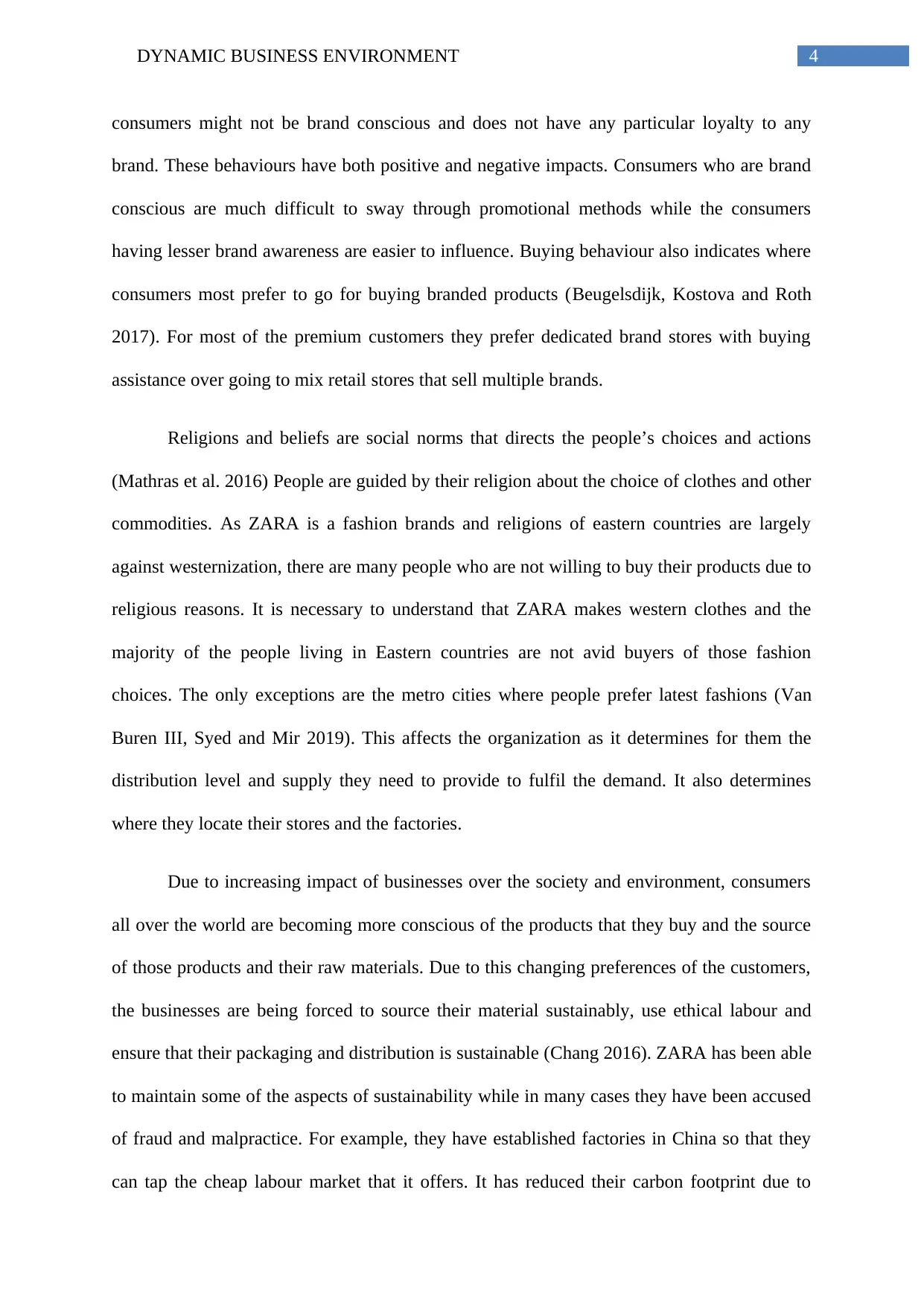
4DYNAMIC BUSINESS ENVIRONMENT
consumers might not be brand conscious and does not have any particular loyalty to any
brand. These behaviours have both positive and negative impacts. Consumers who are brand
conscious are much difficult to sway through promotional methods while the consumers
having lesser brand awareness are easier to influence. Buying behaviour also indicates where
consumers most prefer to go for buying branded products (Beugelsdijk, Kostova and Roth
2017). For most of the premium customers they prefer dedicated brand stores with buying
assistance over going to mix retail stores that sell multiple brands.
Religions and beliefs are social norms that directs the people’s choices and actions
(Mathras et al. 2016) People are guided by their religion about the choice of clothes and other
commodities. As ZARA is a fashion brands and religions of eastern countries are largely
against westernization, there are many people who are not willing to buy their products due to
religious reasons. It is necessary to understand that ZARA makes western clothes and the
majority of the people living in Eastern countries are not avid buyers of those fashion
choices. The only exceptions are the metro cities where people prefer latest fashions (Van
Buren III, Syed and Mir 2019). This affects the organization as it determines for them the
distribution level and supply they need to provide to fulfil the demand. It also determines
where they locate their stores and the factories.
Due to increasing impact of businesses over the society and environment, consumers
all over the world are becoming more conscious of the products that they buy and the source
of those products and their raw materials. Due to this changing preferences of the customers,
the businesses are being forced to source their material sustainably, use ethical labour and
ensure that their packaging and distribution is sustainable (Chang 2016). ZARA has been able
to maintain some of the aspects of sustainability while in many cases they have been accused
of fraud and malpractice. For example, they have established factories in China so that they
can tap the cheap labour market that it offers. It has reduced their carbon footprint due to
consumers might not be brand conscious and does not have any particular loyalty to any
brand. These behaviours have both positive and negative impacts. Consumers who are brand
conscious are much difficult to sway through promotional methods while the consumers
having lesser brand awareness are easier to influence. Buying behaviour also indicates where
consumers most prefer to go for buying branded products (Beugelsdijk, Kostova and Roth
2017). For most of the premium customers they prefer dedicated brand stores with buying
assistance over going to mix retail stores that sell multiple brands.
Religions and beliefs are social norms that directs the people’s choices and actions
(Mathras et al. 2016) People are guided by their religion about the choice of clothes and other
commodities. As ZARA is a fashion brands and religions of eastern countries are largely
against westernization, there are many people who are not willing to buy their products due to
religious reasons. It is necessary to understand that ZARA makes western clothes and the
majority of the people living in Eastern countries are not avid buyers of those fashion
choices. The only exceptions are the metro cities where people prefer latest fashions (Van
Buren III, Syed and Mir 2019). This affects the organization as it determines for them the
distribution level and supply they need to provide to fulfil the demand. It also determines
where they locate their stores and the factories.
Due to increasing impact of businesses over the society and environment, consumers
all over the world are becoming more conscious of the products that they buy and the source
of those products and their raw materials. Due to this changing preferences of the customers,
the businesses are being forced to source their material sustainably, use ethical labour and
ensure that their packaging and distribution is sustainable (Chang 2016). ZARA has been able
to maintain some of the aspects of sustainability while in many cases they have been accused
of fraud and malpractice. For example, they have established factories in China so that they
can tap the cheap labour market that it offers. It has reduced their carbon footprint due to
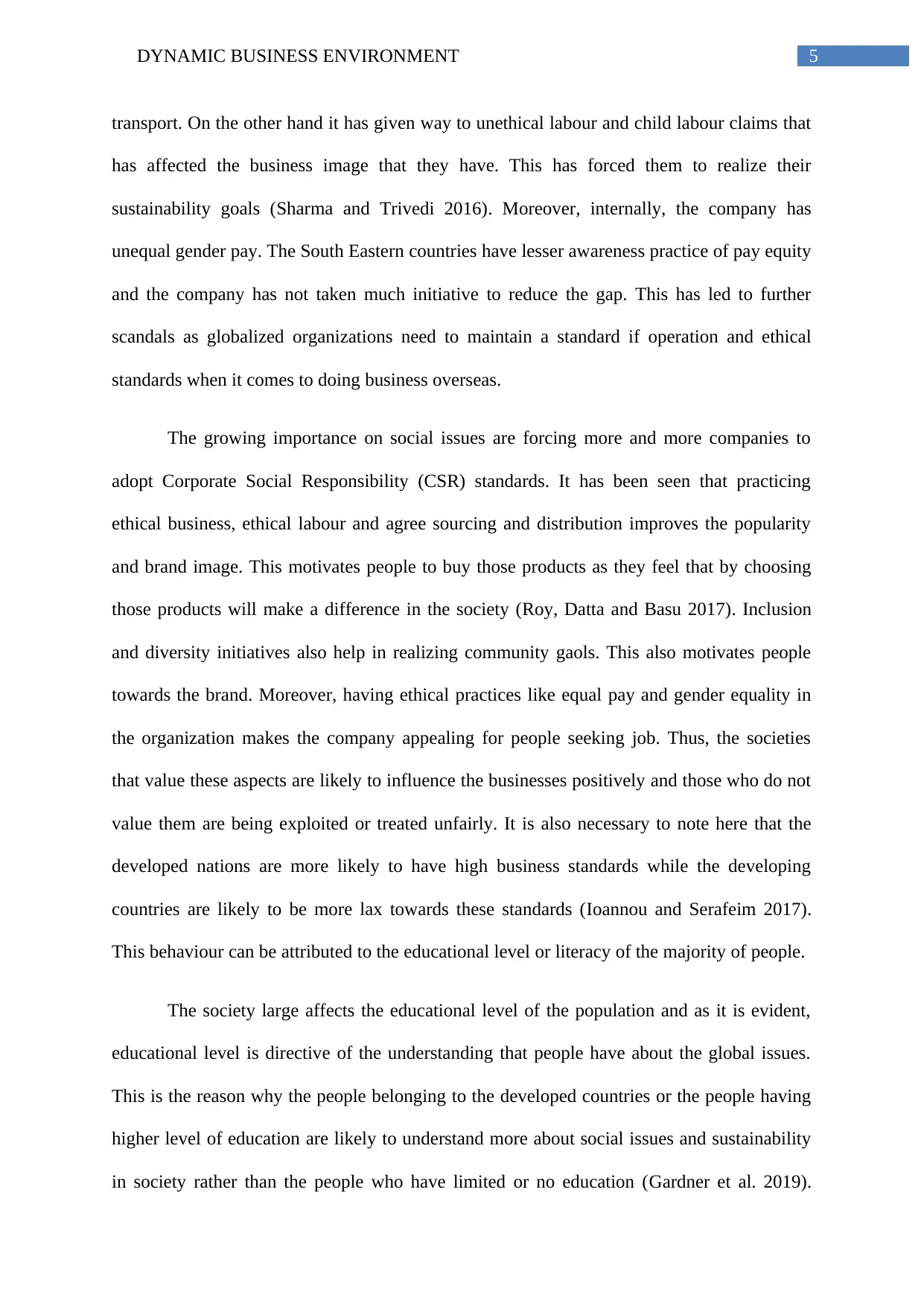
5DYNAMIC BUSINESS ENVIRONMENT
transport. On the other hand it has given way to unethical labour and child labour claims that
has affected the business image that they have. This has forced them to realize their
sustainability goals (Sharma and Trivedi 2016). Moreover, internally, the company has
unequal gender pay. The South Eastern countries have lesser awareness practice of pay equity
and the company has not taken much initiative to reduce the gap. This has led to further
scandals as globalized organizations need to maintain a standard if operation and ethical
standards when it comes to doing business overseas.
The growing importance on social issues are forcing more and more companies to
adopt Corporate Social Responsibility (CSR) standards. It has been seen that practicing
ethical business, ethical labour and agree sourcing and distribution improves the popularity
and brand image. This motivates people to buy those products as they feel that by choosing
those products will make a difference in the society (Roy, Datta and Basu 2017). Inclusion
and diversity initiatives also help in realizing community gaols. This also motivates people
towards the brand. Moreover, having ethical practices like equal pay and gender equality in
the organization makes the company appealing for people seeking job. Thus, the societies
that value these aspects are likely to influence the businesses positively and those who do not
value them are being exploited or treated unfairly. It is also necessary to note here that the
developed nations are more likely to have high business standards while the developing
countries are likely to be more lax towards these standards (Ioannou and Serafeim 2017).
This behaviour can be attributed to the educational level or literacy of the majority of people.
The society large affects the educational level of the population and as it is evident,
educational level is directive of the understanding that people have about the global issues.
This is the reason why the people belonging to the developed countries or the people having
higher level of education are likely to understand more about social issues and sustainability
in society rather than the people who have limited or no education (Gardner et al. 2019).
transport. On the other hand it has given way to unethical labour and child labour claims that
has affected the business image that they have. This has forced them to realize their
sustainability goals (Sharma and Trivedi 2016). Moreover, internally, the company has
unequal gender pay. The South Eastern countries have lesser awareness practice of pay equity
and the company has not taken much initiative to reduce the gap. This has led to further
scandals as globalized organizations need to maintain a standard if operation and ethical
standards when it comes to doing business overseas.
The growing importance on social issues are forcing more and more companies to
adopt Corporate Social Responsibility (CSR) standards. It has been seen that practicing
ethical business, ethical labour and agree sourcing and distribution improves the popularity
and brand image. This motivates people to buy those products as they feel that by choosing
those products will make a difference in the society (Roy, Datta and Basu 2017). Inclusion
and diversity initiatives also help in realizing community gaols. This also motivates people
towards the brand. Moreover, having ethical practices like equal pay and gender equality in
the organization makes the company appealing for people seeking job. Thus, the societies
that value these aspects are likely to influence the businesses positively and those who do not
value them are being exploited or treated unfairly. It is also necessary to note here that the
developed nations are more likely to have high business standards while the developing
countries are likely to be more lax towards these standards (Ioannou and Serafeim 2017).
This behaviour can be attributed to the educational level or literacy of the majority of people.
The society large affects the educational level of the population and as it is evident,
educational level is directive of the understanding that people have about the global issues.
This is the reason why the people belonging to the developed countries or the people having
higher level of education are likely to understand more about social issues and sustainability
in society rather than the people who have limited or no education (Gardner et al. 2019).
⊘ This is a preview!⊘
Do you want full access?
Subscribe today to unlock all pages.

Trusted by 1+ million students worldwide
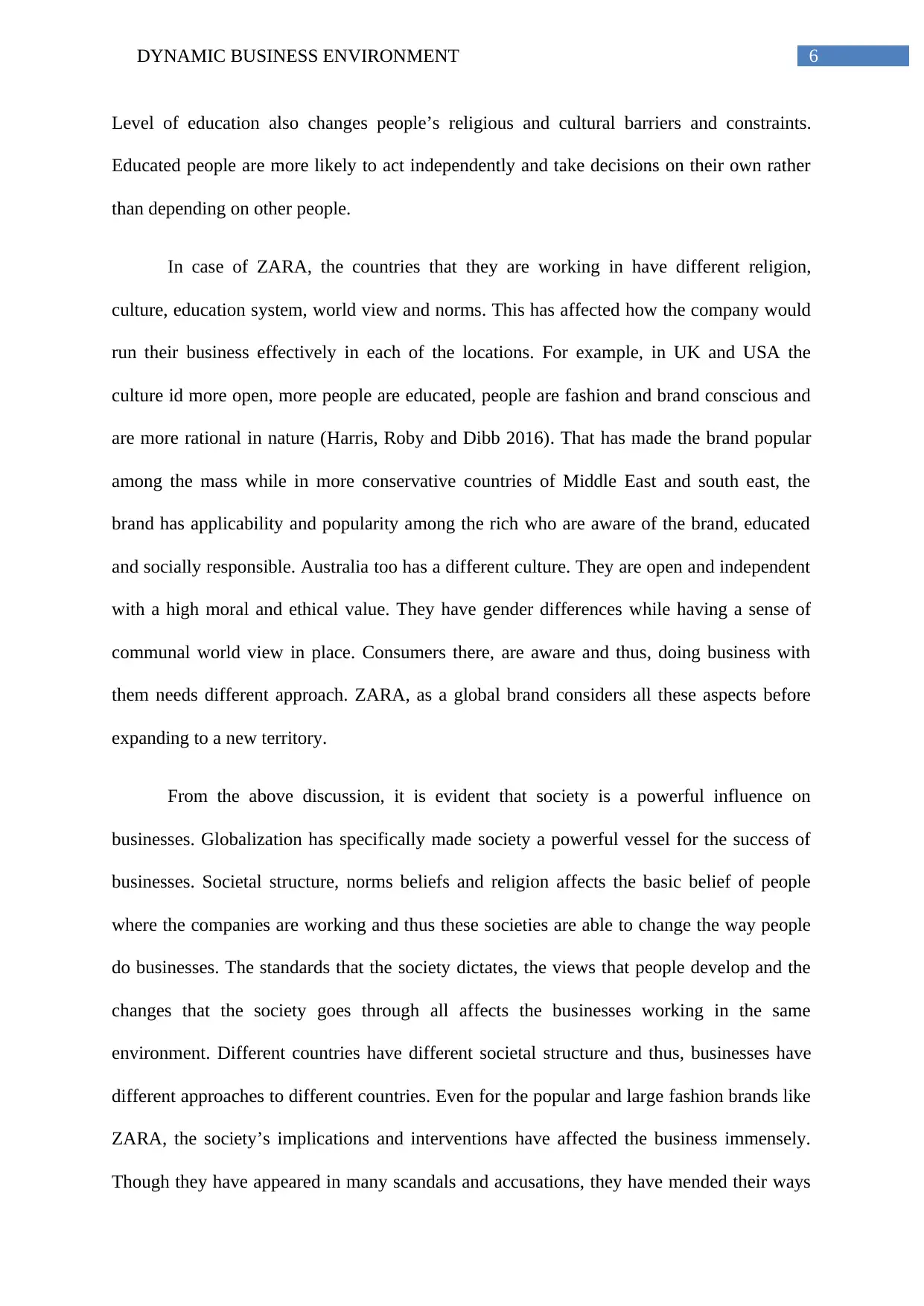
6DYNAMIC BUSINESS ENVIRONMENT
Level of education also changes people’s religious and cultural barriers and constraints.
Educated people are more likely to act independently and take decisions on their own rather
than depending on other people.
In case of ZARA, the countries that they are working in have different religion,
culture, education system, world view and norms. This has affected how the company would
run their business effectively in each of the locations. For example, in UK and USA the
culture id more open, more people are educated, people are fashion and brand conscious and
are more rational in nature (Harris, Roby and Dibb 2016). That has made the brand popular
among the mass while in more conservative countries of Middle East and south east, the
brand has applicability and popularity among the rich who are aware of the brand, educated
and socially responsible. Australia too has a different culture. They are open and independent
with a high moral and ethical value. They have gender differences while having a sense of
communal world view in place. Consumers there, are aware and thus, doing business with
them needs different approach. ZARA, as a global brand considers all these aspects before
expanding to a new territory.
From the above discussion, it is evident that society is a powerful influence on
businesses. Globalization has specifically made society a powerful vessel for the success of
businesses. Societal structure, norms beliefs and religion affects the basic belief of people
where the companies are working and thus these societies are able to change the way people
do businesses. The standards that the society dictates, the views that people develop and the
changes that the society goes through all affects the businesses working in the same
environment. Different countries have different societal structure and thus, businesses have
different approaches to different countries. Even for the popular and large fashion brands like
ZARA, the society’s implications and interventions have affected the business immensely.
Though they have appeared in many scandals and accusations, they have mended their ways
Level of education also changes people’s religious and cultural barriers and constraints.
Educated people are more likely to act independently and take decisions on their own rather
than depending on other people.
In case of ZARA, the countries that they are working in have different religion,
culture, education system, world view and norms. This has affected how the company would
run their business effectively in each of the locations. For example, in UK and USA the
culture id more open, more people are educated, people are fashion and brand conscious and
are more rational in nature (Harris, Roby and Dibb 2016). That has made the brand popular
among the mass while in more conservative countries of Middle East and south east, the
brand has applicability and popularity among the rich who are aware of the brand, educated
and socially responsible. Australia too has a different culture. They are open and independent
with a high moral and ethical value. They have gender differences while having a sense of
communal world view in place. Consumers there, are aware and thus, doing business with
them needs different approach. ZARA, as a global brand considers all these aspects before
expanding to a new territory.
From the above discussion, it is evident that society is a powerful influence on
businesses. Globalization has specifically made society a powerful vessel for the success of
businesses. Societal structure, norms beliefs and religion affects the basic belief of people
where the companies are working and thus these societies are able to change the way people
do businesses. The standards that the society dictates, the views that people develop and the
changes that the society goes through all affects the businesses working in the same
environment. Different countries have different societal structure and thus, businesses have
different approaches to different countries. Even for the popular and large fashion brands like
ZARA, the society’s implications and interventions have affected the business immensely.
Though they have appeared in many scandals and accusations, they have mended their ways
Paraphrase This Document
Need a fresh take? Get an instant paraphrase of this document with our AI Paraphraser
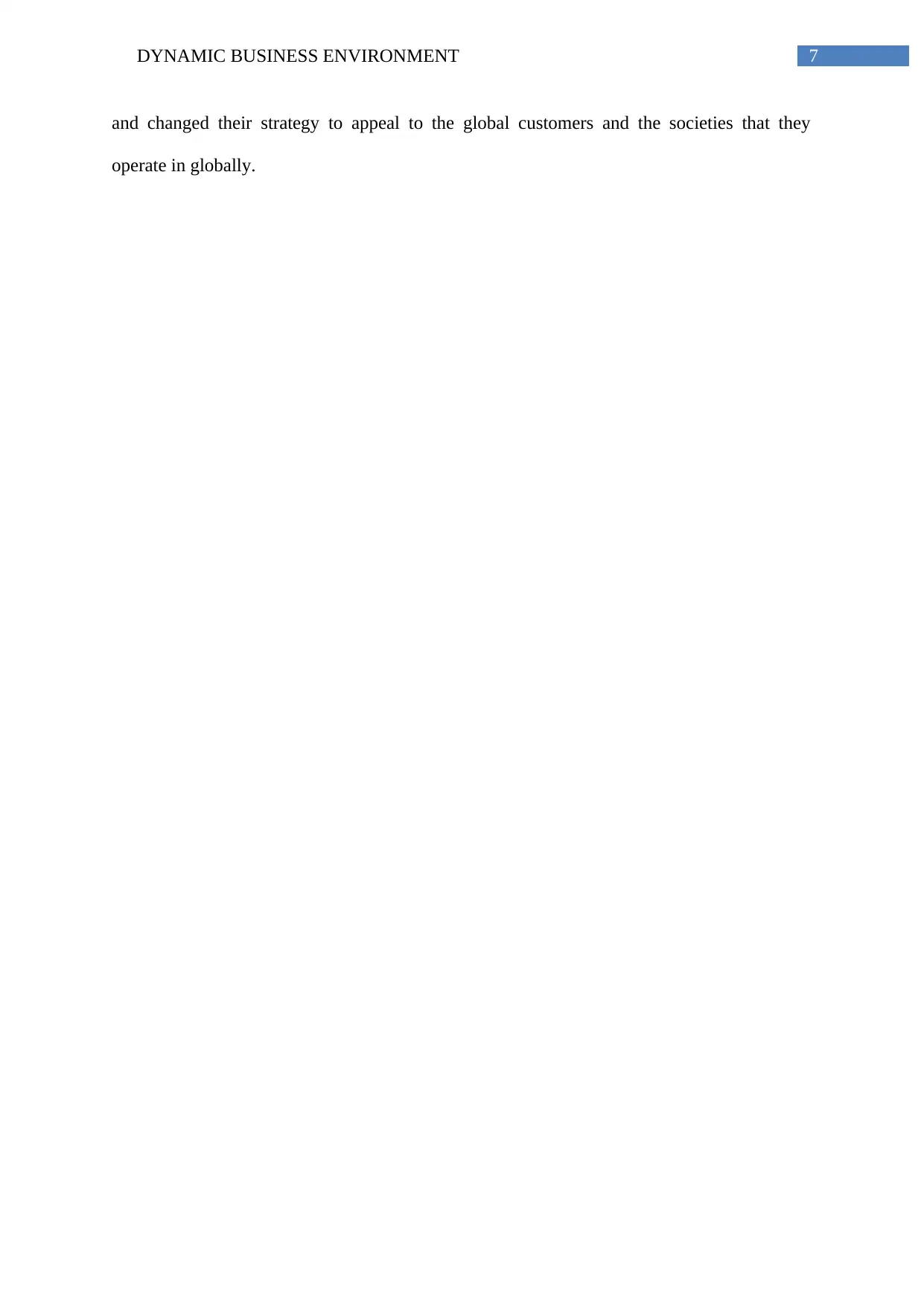
7DYNAMIC BUSINESS ENVIRONMENT
and changed their strategy to appeal to the global customers and the societies that they
operate in globally.
and changed their strategy to appeal to the global customers and the societies that they
operate in globally.
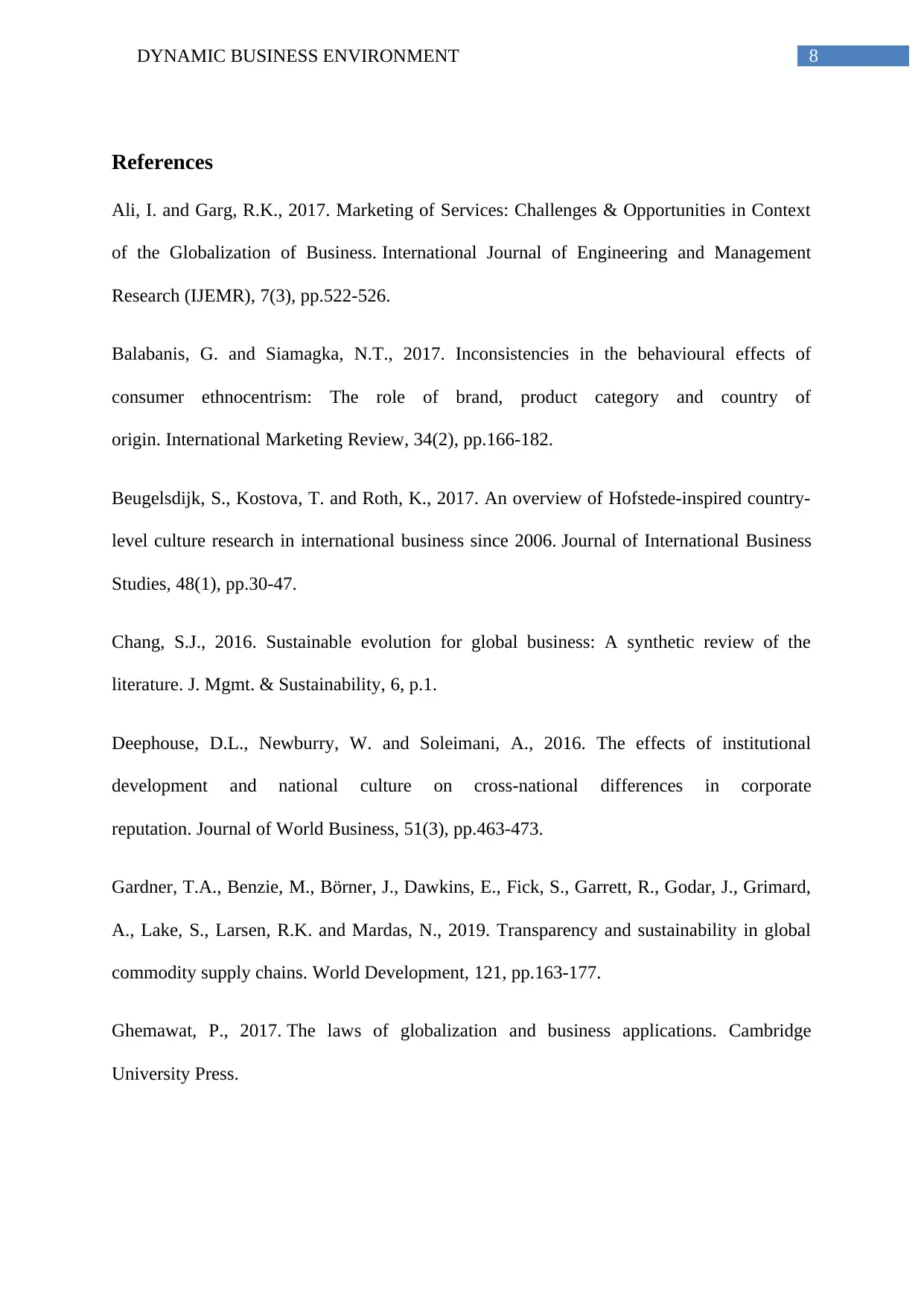
8DYNAMIC BUSINESS ENVIRONMENT
References
Ali, I. and Garg, R.K., 2017. Marketing of Services: Challenges & Opportunities in Context
of the Globalization of Business. International Journal of Engineering and Management
Research (IJEMR), 7(3), pp.522-526.
Balabanis, G. and Siamagka, N.T., 2017. Inconsistencies in the behavioural effects of
consumer ethnocentrism: The role of brand, product category and country of
origin. International Marketing Review, 34(2), pp.166-182.
Beugelsdijk, S., Kostova, T. and Roth, K., 2017. An overview of Hofstede-inspired country-
level culture research in international business since 2006. Journal of International Business
Studies, 48(1), pp.30-47.
Chang, S.J., 2016. Sustainable evolution for global business: A synthetic review of the
literature. J. Mgmt. & Sustainability, 6, p.1.
Deephouse, D.L., Newburry, W. and Soleimani, A., 2016. The effects of institutional
development and national culture on cross-national differences in corporate
reputation. Journal of World Business, 51(3), pp.463-473.
Gardner, T.A., Benzie, M., Börner, J., Dawkins, E., Fick, S., Garrett, R., Godar, J., Grimard,
A., Lake, S., Larsen, R.K. and Mardas, N., 2019. Transparency and sustainability in global
commodity supply chains. World Development, 121, pp.163-177.
Ghemawat, P., 2017. The laws of globalization and business applications. Cambridge
University Press.
References
Ali, I. and Garg, R.K., 2017. Marketing of Services: Challenges & Opportunities in Context
of the Globalization of Business. International Journal of Engineering and Management
Research (IJEMR), 7(3), pp.522-526.
Balabanis, G. and Siamagka, N.T., 2017. Inconsistencies in the behavioural effects of
consumer ethnocentrism: The role of brand, product category and country of
origin. International Marketing Review, 34(2), pp.166-182.
Beugelsdijk, S., Kostova, T. and Roth, K., 2017. An overview of Hofstede-inspired country-
level culture research in international business since 2006. Journal of International Business
Studies, 48(1), pp.30-47.
Chang, S.J., 2016. Sustainable evolution for global business: A synthetic review of the
literature. J. Mgmt. & Sustainability, 6, p.1.
Deephouse, D.L., Newburry, W. and Soleimani, A., 2016. The effects of institutional
development and national culture on cross-national differences in corporate
reputation. Journal of World Business, 51(3), pp.463-473.
Gardner, T.A., Benzie, M., Börner, J., Dawkins, E., Fick, S., Garrett, R., Godar, J., Grimard,
A., Lake, S., Larsen, R.K. and Mardas, N., 2019. Transparency and sustainability in global
commodity supply chains. World Development, 121, pp.163-177.
Ghemawat, P., 2017. The laws of globalization and business applications. Cambridge
University Press.
⊘ This is a preview!⊘
Do you want full access?
Subscribe today to unlock all pages.

Trusted by 1+ million students worldwide
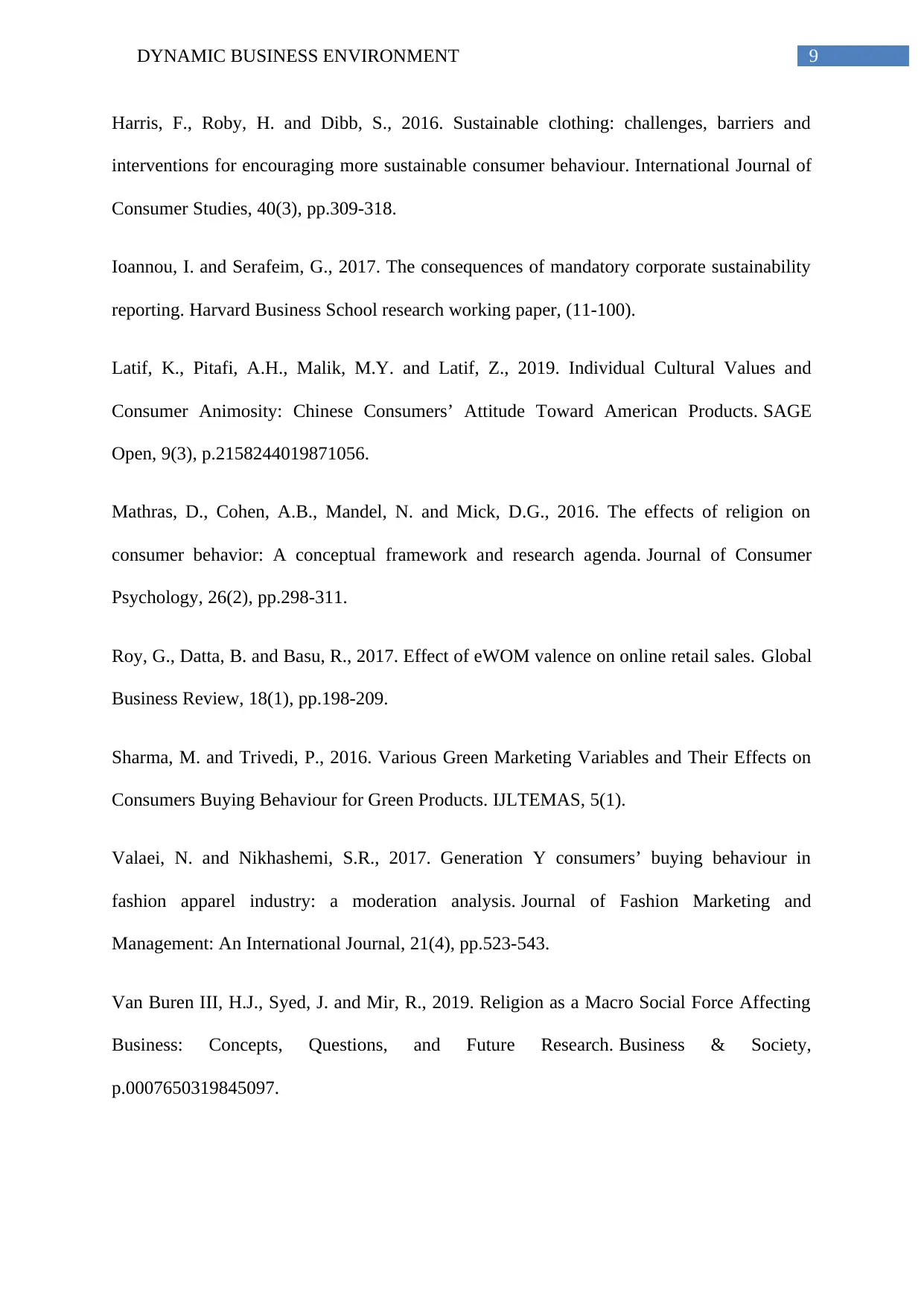
9DYNAMIC BUSINESS ENVIRONMENT
Harris, F., Roby, H. and Dibb, S., 2016. Sustainable clothing: challenges, barriers and
interventions for encouraging more sustainable consumer behaviour. International Journal of
Consumer Studies, 40(3), pp.309-318.
Ioannou, I. and Serafeim, G., 2017. The consequences of mandatory corporate sustainability
reporting. Harvard Business School research working paper, (11-100).
Latif, K., Pitafi, A.H., Malik, M.Y. and Latif, Z., 2019. Individual Cultural Values and
Consumer Animosity: Chinese Consumers’ Attitude Toward American Products. SAGE
Open, 9(3), p.2158244019871056.
Mathras, D., Cohen, A.B., Mandel, N. and Mick, D.G., 2016. The effects of religion on
consumer behavior: A conceptual framework and research agenda. Journal of Consumer
Psychology, 26(2), pp.298-311.
Roy, G., Datta, B. and Basu, R., 2017. Effect of eWOM valence on online retail sales. Global
Business Review, 18(1), pp.198-209.
Sharma, M. and Trivedi, P., 2016. Various Green Marketing Variables and Their Effects on
Consumers Buying Behaviour for Green Products. IJLTEMAS, 5(1).
Valaei, N. and Nikhashemi, S.R., 2017. Generation Y consumers’ buying behaviour in
fashion apparel industry: a moderation analysis. Journal of Fashion Marketing and
Management: An International Journal, 21(4), pp.523-543.
Van Buren III, H.J., Syed, J. and Mir, R., 2019. Religion as a Macro Social Force Affecting
Business: Concepts, Questions, and Future Research. Business & Society,
p.0007650319845097.
Harris, F., Roby, H. and Dibb, S., 2016. Sustainable clothing: challenges, barriers and
interventions for encouraging more sustainable consumer behaviour. International Journal of
Consumer Studies, 40(3), pp.309-318.
Ioannou, I. and Serafeim, G., 2017. The consequences of mandatory corporate sustainability
reporting. Harvard Business School research working paper, (11-100).
Latif, K., Pitafi, A.H., Malik, M.Y. and Latif, Z., 2019. Individual Cultural Values and
Consumer Animosity: Chinese Consumers’ Attitude Toward American Products. SAGE
Open, 9(3), p.2158244019871056.
Mathras, D., Cohen, A.B., Mandel, N. and Mick, D.G., 2016. The effects of religion on
consumer behavior: A conceptual framework and research agenda. Journal of Consumer
Psychology, 26(2), pp.298-311.
Roy, G., Datta, B. and Basu, R., 2017. Effect of eWOM valence on online retail sales. Global
Business Review, 18(1), pp.198-209.
Sharma, M. and Trivedi, P., 2016. Various Green Marketing Variables and Their Effects on
Consumers Buying Behaviour for Green Products. IJLTEMAS, 5(1).
Valaei, N. and Nikhashemi, S.R., 2017. Generation Y consumers’ buying behaviour in
fashion apparel industry: a moderation analysis. Journal of Fashion Marketing and
Management: An International Journal, 21(4), pp.523-543.
Van Buren III, H.J., Syed, J. and Mir, R., 2019. Religion as a Macro Social Force Affecting
Business: Concepts, Questions, and Future Research. Business & Society,
p.0007650319845097.
Paraphrase This Document
Need a fresh take? Get an instant paraphrase of this document with our AI Paraphraser
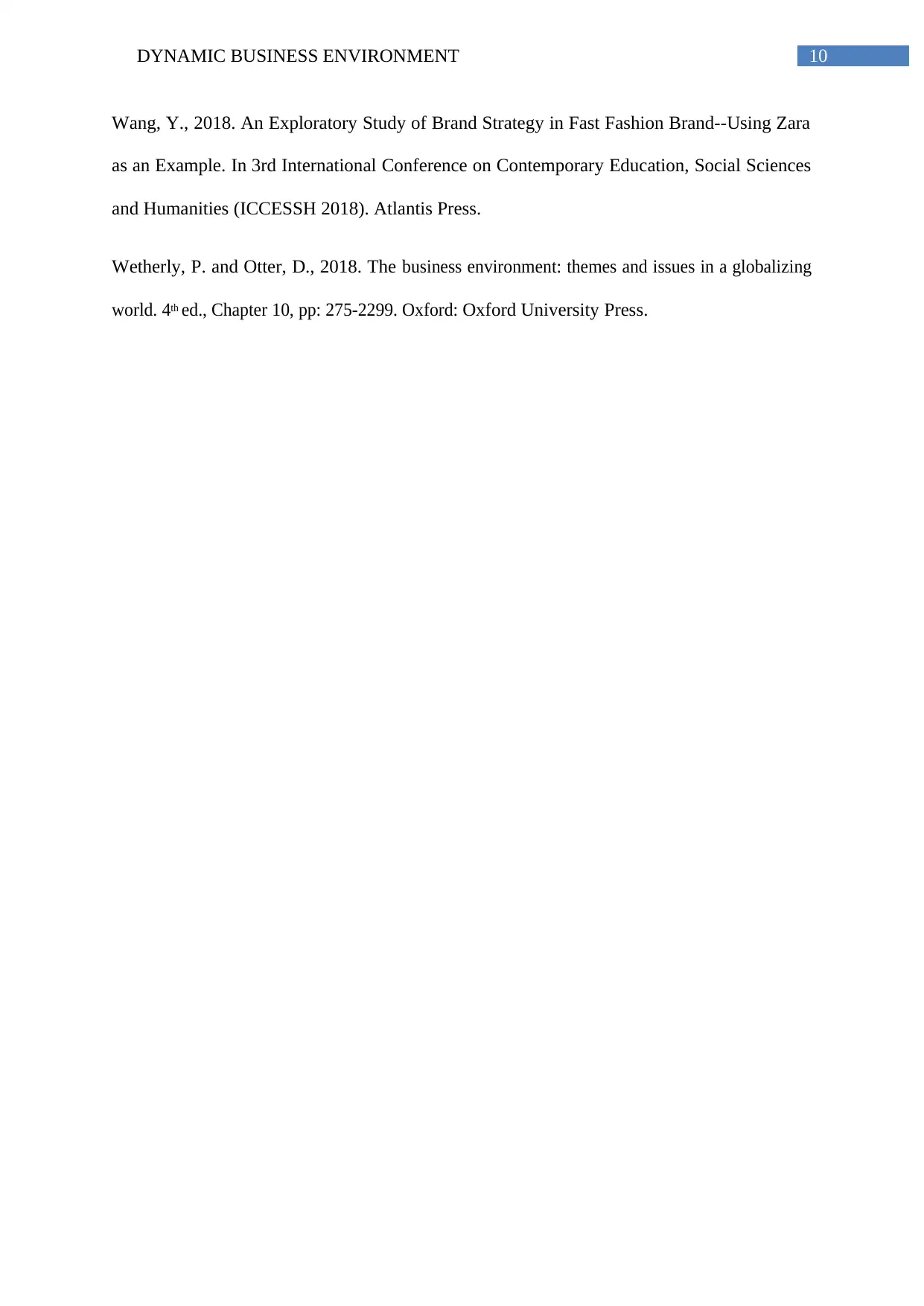
10DYNAMIC BUSINESS ENVIRONMENT
Wang, Y., 2018. An Exploratory Study of Brand Strategy in Fast Fashion Brand--Using Zara
as an Example. In 3rd International Conference on Contemporary Education, Social Sciences
and Humanities (ICCESSH 2018). Atlantis Press.
Wetherly, P. and Otter, D., 2018. The business environment: themes and issues in a globalizing
world. 4th ed., Chapter 10, pp: 275-2299. Oxford: Oxford University Press.
Wang, Y., 2018. An Exploratory Study of Brand Strategy in Fast Fashion Brand--Using Zara
as an Example. In 3rd International Conference on Contemporary Education, Social Sciences
and Humanities (ICCESSH 2018). Atlantis Press.
Wetherly, P. and Otter, D., 2018. The business environment: themes and issues in a globalizing
world. 4th ed., Chapter 10, pp: 275-2299. Oxford: Oxford University Press.
1 out of 11
Related Documents
Your All-in-One AI-Powered Toolkit for Academic Success.
+13062052269
info@desklib.com
Available 24*7 on WhatsApp / Email
![[object Object]](/_next/static/media/star-bottom.7253800d.svg)
Unlock your academic potential
Copyright © 2020–2025 A2Z Services. All Rights Reserved. Developed and managed by ZUCOL.





